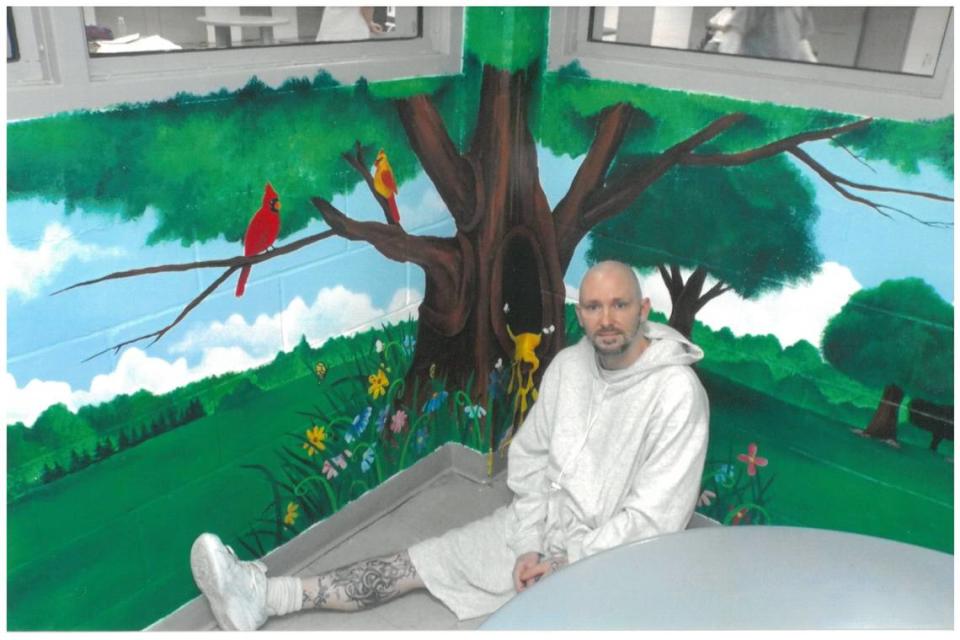‘I had hope’: Kansas Citians protest Missouri execution of Michael Tisius on Tuesday
- Oops!Something went wrong.Please try again later.
Bob Ronan doubts his protest against the Tuesday execution of a Missouri man on death row will garner a lot of attention.
Or make any difference at all.
Still, the 82-year-old and at least a dozen other Kansas Citians stood at the crowded intersection at 39th Street and Troost through spitting rain. They thrust poster boards with the words “Death is Not Justice” and “Thou Shalt Not Kill” into the air.
Their hope, Ronan said, is that more people will see the “silliness of what our state is doing” and maybe Michael Tisius, who was executed by lethal injection around 6 p.m., will be among the last to die by Missouri’s death penalty.
Tisius, 42, died at 6:10 p.m. in an eastern Missouri prison after being convicted of murdering two Randolph County jail guards in 2000. Tisius, who was 19 years old at the time, attempted to break out a fellow prisoner, Roy Vance, who is serving a life sentence.
National and international groups, including the American Bar Association and the Inter-American Commission on Human Rights, urged the state to halt the execution.
As an organizer with the advocacy group Missourians to Abolish the Death Penalty, Ronan hoped the Tisius case would lead to change.
Tisius suffered abuse at a young age. The European Union’s delegation to the U.S. wrote to Missouri Gov. Mike Parson saying the case was “particularly concerning” because neurological experts determined that Mr. Tisius’ serious impairments allowed him to be ‘groomed’ by the prisoner he attempted to free. Tisius’ attorneys also argued more recent evidence showed the brains of those in late adolescence — between 18 and 21 — are not fully developed.

Ronan felt disturbed by the execution after seeing Tisius had publicly shown remorse.
“I had hope,” Ronan said. “But I wasn’t betting the ranch on it.”
“The victims were law enforcement. And that’s usually pretty hard to overcome.”
Ronan has been watching such cases play out for 25 years, since he spent Saturday mornings delivering liturgy to Jefferson City prisoners, some of whom were later put to death.
“Just being with them, you learn that they’re people ... It kinda makes you sick,” he said of those who were executed.
Others lined up on the street corner also felt compelled to act by their faith.
Douglas Kinney of the St. Elizabeth Parish started protesting against the death penalty one year ago after learning about Missouri’s execution of Leonard Taylor, who maintained his innocence until his death.
“There was a lot of things pointing to that he didn’t do it. You’re supposed to be innocent until proven guilty. And for a lot of people its just the opposite,” he said.
Access to money, lawyers and a defendant’s race seem to be able to determine whether someone lives or dies, Kinney said.
Sue Robb of the St. Francis Xavier Parish was upset over Tisius being executed for a crime he committed decades ago.
“We’re not the same people we were 20 years ago or 30 years ago. We change, we grow. We should not be killed for the worst decision we made when we were younger,” she said.
She pointed to the fact Tisius came from an abusive household and his brain had not yet developed as reasons why he should not have been executed.
“All of that needs to be taken into consideration when any sentence is given,” she said.
Robb went on to say that she had hoped Bishop James Johnston of the Kansas City-St. Joseph Diocese would attend the protest, respond to their letters or express support for Tisius.
Both Kinney and Ronan agreed that they were surprised to not hear from him on the case.
Spokesperson for the Kansas City-St. Joseph Diocese Ashlie Hand said the bishop’s schedule did not allow him to attend the protest, but he “did express his support advocating against Mr. Tisius’s death,” in a letter to Parson requesting clemency.
The bishop referred to the death of Tisius as a “tragedy” and said the use of the death penalty “promotes revenge as a principle of criminal justice,” according to the letter.
Archbishop Christophe Pierre, a personal representative of Pope Francis, previously called on Parson to commute Tisius’ sentence to life without parole.
“I think its the sin of apathy ... That’s one of the greatest sins of our time,” Robb said.
Tisius was the third person the state has put to death this year. Fifteen men remain on death row in Missouri, with the next execution scheduled on Aug. 1 for Johnny Johnson, who was convicted of killing a 6-year-old girl.

